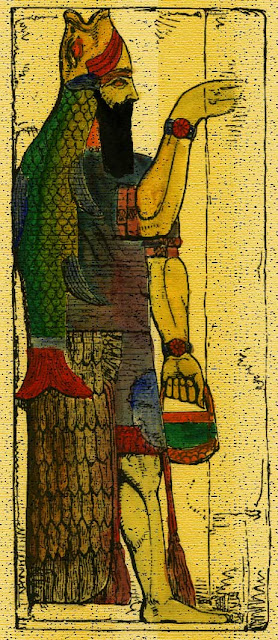1 Samuel 5:1-12
Israel has been attacked by a massive Philistine army. Thirty thousand people are dead. The chest of God is seized. Eli is dead, along with his two sons. The Philistine leaders decide to take the chest of God to Ashdod, and place it in the temple alongside the shrine Dagon. Dagon is the god of grain to the Philistines. Whenever drought comes, the Philistines invoke Dagon's divine power against famine.
After the chest of God is placed beside Dagon, the citizens find the next morning that Dagon is toppled over in front of the chest. They pick him back up, standing him upright again. The next morning, they find Dagon toppled over, with his head and arms strewn across the entrance to the temple. They find only his torso intact, and decide they probably need to get the chest out of there. So, they take it to Gath.
As soon as it arrives in Gath, people are afflicted with tumors. Young and old, everyone gets tumors. Everyone blames it on the chest of God, so they move it to Ekron.
Before the Philistines are able to move the chest into Ekron, the people protest. They've heard what's happened in the neighboring cities with the tumors and all, and they want nothing to do with it. They've already started getting the same tumors that the other cities got, and moreso rats are starting to swarm the city. People are dying and there is mass hysteria. They stop the Philistines in their tracks because they don't want any more than they already have.
The chest of God is in the hands of a population who doesn't want anything to do with the God of Israel. They transfer it from place to place, bringing with them tumors, disease-carrying rats, and death. What originally was loot from a rout of Israel, turned into a source of chaos. The chest of God was sacred to the Israelites, booty for the Philistines, and death for the citizens of Gath, Ashdod, and Ekron. The further the chest gets from its roots, the more catastrophe ensues.
The Philistines placed the chest alongside Dagon, and Dagon fell repeatedly. What were they supposed to do with this thing?
This story reminds me of late nights at the bar, talking about spiritual things and talking about God. I remember having a heart of shame and a mind of delusion, yet my words made the people around me think I knew what I was talking about. My heart was void of the sacred, yet I tried to make it work. I thought that words and deeds and knowledge would be enough to cancel out all the drunken delusions that were controlling my life, but the more I tried the more I found catastrophe. I couldn't mold the sacred into the delusions of my heart. They just wouldn't fuse together.
I carried my chest of God - the Bible, my religious experience, my scriptural knowledge - but inwardly my heart had no intention of letting go of my real master. I would blame God, blame my friends, and blame the Church for my problems, but I was blind to my own idolatry. The only reason it was idolatry is because I carried the chest of God, but my heart sought the god of grain. Terror, shame, bewilderment, and fear were the byproducts of God, not the symptoms of my own decision to worship alcohol.
Everywhere the chest of God traveled, the people blamed their problems on the God of Israel. When tumors came, it was God's fault. When rats swarmed the villages, it was God's fault. Had they not decided to take in the chest of God? Had they not physically accepted the sacred, while inwardly they worshiped their own gods who had been there for thousands of years?
When we inwardly worship one god, and outwardly worship Jehovah, we are asking for trouble. It's on us though. It's better to go all out worshiping the one we want, and sticking with that one, than trying to worship alcohol and God, or drugs and God, or anything else and God. Eventually, I stayed with alcohol until it stopped providing what I needed. It was only then that I decided to dive into, with everything I had in me, this God I found in the scriptures.
When we choose to carry the chest of God into our daily lives, we are prone to negative stuff if we're still holding onto Dagan. We may as well drop the chest, and "bop 'til we drop," as my former sponsor says. It just doesn't work trying to carry the chest and Dagon at the same time. God is or isn't. The life of trying to let God and Dagon co-exist is not sustainable. However, when we begin the hard work of letting go of Dagon, we find that it wasn't God who was bringing the plague. We were bringing the plague on ourselves, but were too deluded to see it.
When we drop Dagon, we find a God who loves us more than we can ever love ourselves. We find the sacred that we were always looking for. We find something to believe in, something to hope for, something to get excited about, something to look forward to. We find that joy replaces restlessness, peace replaces terror, and grace replaces shame. We find a God who was there all along, who's heart was in it for us the whole time. We just had to let go of Dagon.

It struck me that they took the chest to war assuming it held the power of God to defeat the enemy. Thousands perished under a false assumption. This wasn't the case of an enemy coming in and robbing. They brought the chest to war. Imagine how it was being with the chest and waiting for God to miraculously overcome the enemy. I wonder if somebody opened the chest and tried to shoo God out.
ReplyDelete